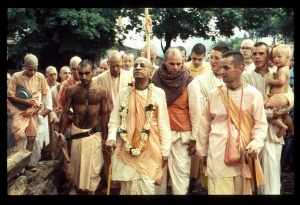SB 4.13.25

A.C. Bhaktivedanta Swami Prabhupada
TEXT 25
- maitreya uvāca
- aṅgo 'śvamedhaṁ rājarṣir
- ājahāra mahā-kratum
- nājagmur devatās tasminn
- āhūtā brahma-vādibhiḥ
SYNONYMS
maitreyaḥ uvāca — Maitreya answered; aṅgaḥ — King Aṅga; aśvamedham — aśvamedha sacrifice; rāja-ṛṣiḥ — the saintly king; ājahāra — executed; mahā-kratum — great sacrifice; na — not; ājagmuḥ — came; devatāḥ — the demigods; tasmin — in that sacrifice; āhūtāḥ — being invited; brahma-vādibhiḥ — by the brāhmaṇas expert in executing sacrifices.
TRANSLATION
Śrī Maitreya replied: My dear Vidura, once the great King Aṅga arranged to perform the great sacrifice known as aśvamedha. All the expert brāhmaṇas present knew how to invite the demigods, but in spite of their efforts, no demigods participated or appeared in that sacrifice.
PURPORT
A Vedic sacrifice is not an ordinary performance. The demigods used to participate in such sacrifices, and the animals sacrificed in such performances were reincarnated with new life. In this age of Kali there are no powerful brāhmaṇas who can invite the demigods or give renewed life to animals. Formerly, the brāhmaṇas well conversant in Vedic mantras could show the potency of the mantras, but in this age, because there are no such brāhmaṇas, all such sacrifices are forbidden. The sacrifice in which horses were offered was called aśvamedha. Sometimes cows were sacrificed (gavālambha), not for eating purposes, but to give them new life in order to show the potency of the mantra. In this age, therefore, the only practical yajña is saṅkīrtana-yajña, or chanting of the Hare Kṛṣṇa mantra twenty-four hours a day.